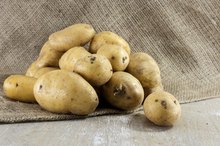The Effects of Fasting on Skin
Fasting is done in many cultures for political, spiritual and health reasons. While some people fast to show their devotion to their deity or to protest an unfair law, there are a large number of people turning to fasting to improve their health. Weight loss is the most commonly cited reason to fast; however, fasting has been shown through a number of studies to have both positive and negative effects on the skin.
Blemishes
If your skin is prone to breakouts or even just the occasional blemish, it is highly possible that while fasting you will experience an episode of acne on or around the third day of your fast. Because you are not putting anything into your body except water, your body is now able to focus on cleansing your system instead of digesting and breaking down food. It is akin to a spring cleaning for your body. While your body is cleansing itself of toxins, some of these will be leaving your body through your skin, creating some blemishes on the surface.
- If your skin is prone to breakouts or even just the occasional blemish, it is highly possible that while fasting you will experience an episode of acne on or around the third day of your fast.
- While your body is cleansing itself of toxins, some of these will be leaving your body through your skin, creating some blemishes on the surface.
Clearer Skin
How to Regrow New Skin
Learn More
Once your body has adjusted to fasting, usually the fourth or fifth day into a water fast, there is a marked improvement in skin appearance. Staying well-hydrated is very important to achieving this, as your water intake greatly assists your body in quickly flushing out toxins that cause blemishes. Daily vitamins also help your body retain its ability to heal impurities on the skin's surface 1. If you keep your body well-hydrated, take a daily vitamin, and keep your skin clean and well-moisturized, you can look forward to seeing your skin clear up several days into your fast.
- Once your body has adjusted to fasting, usually the fourth or fifth day into a water fast, there is a marked improvement in skin appearance.
- Staying well-hydrated is very important to achieving this, as your water intake greatly assists your body in quickly flushing out toxins that cause blemishes.
Skin Conditions
Medical skin conditions such as dermatitis, urticaria and psoriasis have been studied with great attention by medical professionals. In a study conducted by Hamamatsu University School of Medicine in Shizuoka, Japan, it was shown that a fasting diet as treatment for such skin conditions on a monthly basis can improve the skin's condition. Inflammation and frequency of outbreaks, as well as the severity of those outbreaks were diminished when patients were put on a fasting diet. Fasting cannot be sustained as an ongoing form of treatment, but when paired with a sensible vegetarian diet, periods of fasting each month have been shown to significantly improve the condition of the patient's skin. However, it is important to consult with your physician or dermatologist before beginning any new treatment and before discontinuing any current treatment.
- Medical skin conditions such as dermatitis, urticaria and psoriasis have been studied with great attention by medical professionals.
- In a study conducted by Hamamatsu University School of Medicine in Shizuoka, Japan, it was shown that a fasting diet as treatment for such skin conditions on a monthly basis can improve the skin's condition.
Related Articles
References
- "Do You Have the Guts to Be Beautiful?;" Mitra Ray PH.D, Jennifer Daniels M.D.; 2009
- Collier R. Intermittent fasting: the next big weight loss fad. CMAJ. 2013;185(8):E321–E322. doi:10.1503/cmaj.109-4437
- Patterson RE, Laughlin GA, LaCroix AZ, et al. Intermittent fasting and human metabolic health. J Acad Nutr Diet. 2015;115(8):1203–1212. doi:10.1016/j.jand.2015.02.018
- Varady KA, Bhutani S, Church EC, Klempel MC. Short-term modified alternate-day fasting: a novel dietary strategy for weight loss and cardioprotection in obese adults. Am J Clin Nutr. 2009;90(5):1138-43. doi:10.3945/ajcn.2009.28380
- Arnason TG, Bowen MW, Mansell KD. Effects of intermittent fasting on health markers in those with type 2 diabetes: A pilot study. World J Diabetes. 2017;8(4):154–164. doi:10.4239/wjd.v8.i4.154
- Trepanowski JF, Kroeger CM, Barnosky A, et al. Effect of alternate-day fasting on weight loss, weight maintenance, and cardioprotection among metabolically healthy obese adults: a randomized clinical trial. JAMA Intern Med. 2017;177(7):930-938. doi:10.1001/jamainternmed.2017.0936
- Zhang J, Zhan Z, Li X, et al. Intermittent Fasting Protects against Alzheimer's Disease Possible through Restoring Aquaporin-4 Polarity. Front Mol Neurosci. 2017;10:395. Published 2017 Nov 29. doi:10.3389/fnmol.2017.00395
- Harvie M, Howell A. Potential benefits and harms of intermittent energy restriction and intermittent fasting amongst obese, overweight and normal weight subjects-A narrative review of human and animal evidence. Behav Sci (Basel). 2017;7(1):4. Published 2017 Jan 19. doi:10.3390/bs7010004
- Barnosky AR, Hoddy KK, Unterman TG, Varady KA. Intermittent fasting vs daily calorie restriction for type 2 diabetes prevention: a review of human findings. Translational research: The Journal of Laboratory and Clinical Medicine. 2014;164(4):302-11.
- Martin B, Mattson M, Maudsley S. Caloric restriction and intermittent fasting: Two potential diets for successful brain aging. Ageing Res Rev. 2006;5(3):332-353.
- St-Onge MP, Ard J, Baskin ML, Chiuve SE, Johnson HM, Kris-Etherton P, et al. Meal Timing and Frequency: Implications for Cardiovascular Disease Prevention: A Scientific Statement from the American Heart Association. Circulation. 2017;135(9):e96-e121.
- Stote KS, Baer DJ, Spears K, et al. A controlled trial of reduced meal frequency without caloric restriction in healthy, normal-weight, middle-aged adults. Am J Clin Nutr. 2007;85(4):981-8.
- Zauner C, Schneeweiss B, Kranz A, et al. Resting energy expenditure in short-term starvation is increased as a result of an increase in serum norepinephrine. Am J Clin Nutr. 2000;71(6):1511-1515.
Writer Bio
Noel Stanchfield is a travel, health and beauty writer. She has been writing from firsthand experience since 2004, contributing to various online publications.









